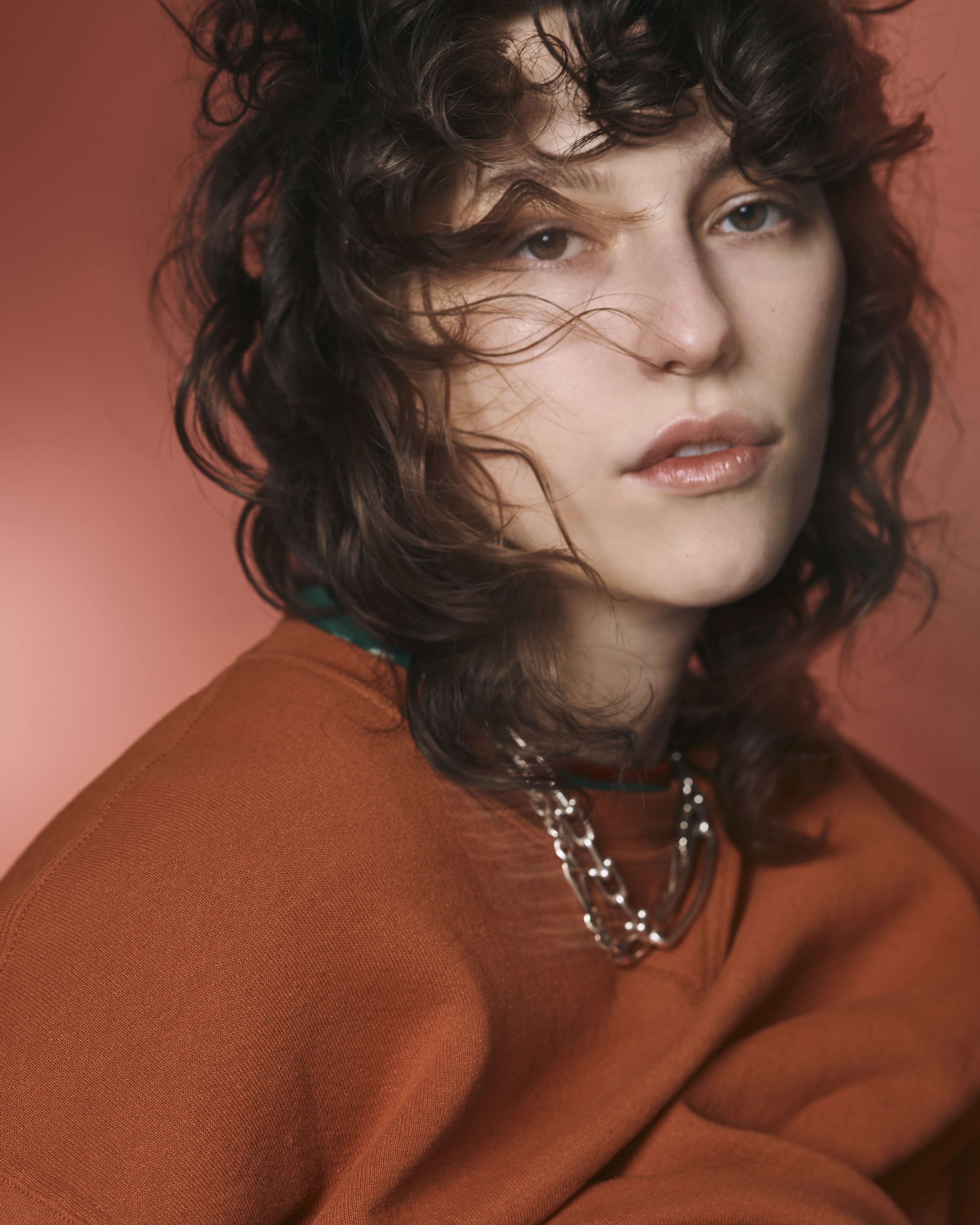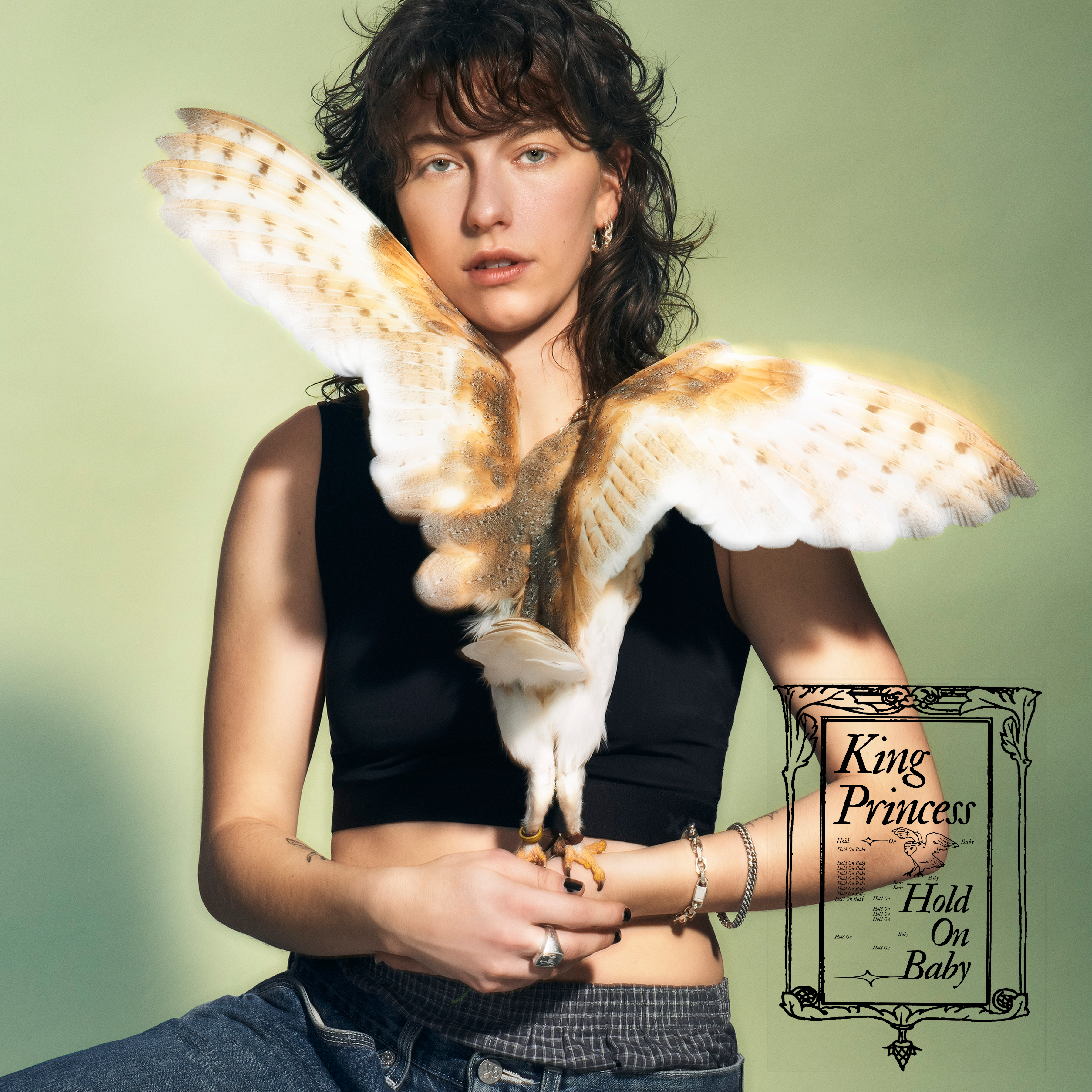News feed

It’s nearly 8pm on a Wednesday night in Brooklyn, New York when I connect to Mikaela Mullaney Straus – aka King Princess – on a Zoom call. She’s sitting on her bed with a red wine in one hand and a vape in the other. Her girlfriend Quinn Wilson is in the background raiding her mother’s vintage shoe collection from the basement. “Oh my gosh what are those,” King Princess exclaims, looking past the webcam and at some fabulous pair of shoes. She looks back at me and continues, “Quinn fits into my mum’s shoes.
“I also don’t wear heels so this incredible shoe collection my mum has arranged over years and years goes to waste with me,” she adds. “I’m a non-binary queer person that doesn’t wear heels. My cis-gendered girlfriend wears heels – she’s stomping around the house!”
King Princess is quick to call out the thick Australian accent of myself and her local publicist. We laugh and reminisce on old Australian television sit coms, a niche genre that the 23-year-old is surprisingly well-versed in. It’s clear that the indie singer carries the same relaxed rock ‘n’ roll sensibility that can be heard in her music, but she’s not without her demons and isn’t afraid to sing what she feels.
This month, King Princess released her second studio album Hold On Baby following viral success from hit singles “1950” (a personal favourite of Harry Styles) and “Talia”. Before she travels to Australia to support Florence + The Machine‘s tour, we caught up with the star to discuss her upbringing in New York City, rising to fame and working with legendary producer, Mark Ronson.
GRAZIA: Not many people can say they grew up in Brooklyn. Can you recall that experience?
King Princess: “It was super cool. Growing up in New York is a weird, amazing privilege where you are just inundated with art and culture and people of all different walks of life. All I knew was this city and it has shaped so much about how I communicate, how I meet people, my openness. It’s such a city of individuals.”
“Hold on Baby” forms the interlude for the body of work. Why did you choose it as the title track?
KP: “I chose the title track before I wrote the interlude. But that melody at the end of the interlude was actually written as a joke – me and [songwriter] Ethan Gruska wrote that as like a lol. And then we thought, that’s a really good melody… I chose it because that’s what I’ve been saying to myself for the past five years now: just hold on.”

What inspired the album?
KP: “Anti-depressants (laughs). Figuring out my s**t. It’s a really really challenging world we live in and a really challenging time to be young. I know I feel it. I feel so out of my body sometimes that I’m so disillusioned by the world and I feel like I turn into a shell, and stay inside and don’t do anything. While I was doing that for two years I thought, ‘I need to write about this. Because this is not healthy.’ I’m a social person but I’m introverted in some ways and I feel like I really lost a big part of myself when I went into isolation. I was feeling so down that I wasn’t seeing people. I wanted to write about those feelings, we all feel that way sometimes. Some more than others. People are resonating with the themes and people are wanting to feel good about themselves but knowing how hard that is.”
Did you feel any pressure backing up your debut album with this second body of work?
KP: “Yes, I felt pressure (nervous laughs). I felt really sad and really stressed out but what I came too was a record that I’m very proud of, that one day I will be proud to have made this record for the rest of my life. I love this music, I think it’s great, I love playing this music live… I don’t want to ever [release music] that I don’t feel this way about.”
In a past interview, you recalled what a huge deal it was when Harry Styles tweeted about you in 2018. Looking back, how have you personally and professionally evolved since that time?
KP: “I think my music is better. I’ve gotten better at making music and I’ve gotten better at playing live. I’m more openly sensitive and kind. I’ve spent a lot of time working out how to be a better friend, a better girlfriend, family member. I have a lot of work to do but I see an evolution in myself that is for the better, just as a person. That’s the goal right? To not be a d**k. I would really like to leave a positive mark on whatever I do and even when it’s hard and the music is sad, I hope that it’s aiding someone in their journey. In order to do that you’ve got to be honest and really feel that way.”
Did you ever expect your music to take off with the track “1950”? It’s certainly where I first discovered you.
KP: “I knew that song was really good. I didn’t know it was going to go viral. To some degree it’s hard because you’re chasing after those 550 million streams… it’s so crazy how many streams that song has! It’s like a Drake song! That song popped off on a whim. There was no promotion behind it, there was no big money organisation funding on the low. The people just loved that song. So, I had to go back and do all this ground work and realise what type of artist I want to be, because one song does not an artist make.”
You’re currently signed with Mark Ronson’s Zelig Records. What career lessons have you learnt from the producer?
KP: “I’ve learned a lot about sonics and recording and how s**t has to sound good. Getting things to sound good requires innovation, it requires getting into the nitty gritty, getting real players, getting people to come in and play with you… because music is communal, music inner personal.”
You’re returning to Australia and New Zealand in 2023 to support Florence + The Machine’s World tour. What do you love most about being on stage?
KP: “The crowds are wild. The gays are wild. Gay people in Australia go extra hard at shows. I think you guys have an appreciation for music in a way that… [the US] have pop radio and we have this hierarchy systems of charts but y’all have Triple J. Triple J plays what Triple J likes and its good music and it’s across all genres. It’s not specific to queer versus straight…the people who listen to it have a lot of autonomy and choice. That is so foreign to me as an American musician because you just have no say.”
The lyrics from many of your tracks are incredibly vulnerable. Can you recall how it feels to sing those lyrics to a live audience?
KP: “It feels really good because when you’re validated for your most inner, introspective, personal feelings – we all have them – some of us are just extra enough to write them down. I feel really amazing when I get that osmosis, that transfer of energy from people. It’s even more healing than recording it. You’re releasing this energy, this pain. I love it.”
What did you have to do to break through that mainstream/pop sphere to really have your career take off in the US?
KP: “I haven’t (laughs). I love my career in the US, I love playing shows and I love my fanbase. But I’m not on pop radio. For all intent and purposes I’m an indie artist and I think that what is also nice about coming to Australia is how much love there is for people coming in and playing shows… artists are taken care of in a way that, we just don’t roll like that.”
What do you hope listeners take from this new album?
KP: “I hope that people listen to this album and think that they’re being too hard on themselves. That it’s ok to feel incredibly overwhelmed and saddened by life, but that through art we can figure out ways to cope. You’re never alone in those thoughts.”
King Princess’s new album “Hold On Baby” is available to stream now.









